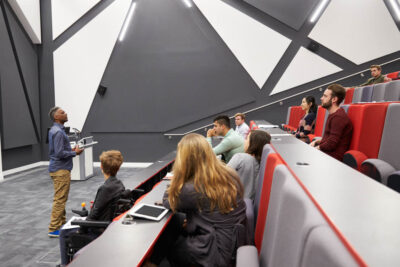- All Blog Categories
- Adult Education Blog
- Advancement Blog
- Community College Blog
- Data & Analytics Blog
- Enrollment Blog
- Higher Education Strategy Blog
- K-12 District Leadership Blog
- Student Success Blog
Our Blogs
Get the latest insights from EAB experts on a variety of topics and terrains from enrollment to student success to K-12 education to higher education strategy and beyond.

Five areas enrollment leaders are prioritizing in 2026

3 headwinds shaping graduate and adult enrollment in 2026

What higher ed can learn from these successful academic program revitalizations

What are students asking university chatbots?
EAB Blogs by the Numbers
100+
Blogs authored last year8
Different blogs that span topics in education53
Contributing expertsRecent and Featured Posts from Every Blog
-
Adult Education Blog
The big bets that actually drive online enrollment growth
Learn how colleges can grow online enrollment sustainably—by achieving product-market fit, overcoming growth plateaus, and scaling with intention.
Blog -
Student Success Blog
Career readiness can’t wait until junior year
Career exploration can’t wait. Learn how first-year programs can build early career readiness through low-risk experiences and applied learning.
Blog -
Higher Education Strategy Blog
A winning platform for higher education in a high-scrutiny era
Higher ed’s social contract is shifting. Learn why public trust is eroding, how accountability is changing, and what colleges must do to prove value.
Blog -
Student Success Blog
What matters to student success teams in 2026
See what student success leaders are prioritizing for 2026—from retention to career readiness—and how institutions can overcome capacity constraints.
Blog -
Adult Education Blog
How to use state demand data to launch or revitalize programs
When designing new academic programs, faculty and institutional leaders often fall back on the familiar: develop a specialization in my research area, add a prestigious terminal degree in our field, and see what our peers have been developing.
Blog -
Enrollment Blog
Students are engaging earlier. Enrollment strategies should follow.
New data show students are engaging with colleges earlier in high school. Learn what this shift means for enrollment timing and recruitment strategy.
Blog -
Higher Education Strategy Blog
Why advising reform can’t wait—and what colleges and universities must do now
Learn why current advising models fall short for today's college and university students and how appreciative advising can close the gap.
Blog -
Enrollment Blog
Empower high school counselors to strengthen your recruitment pipeline
High school counselors shape enrollment outcomes. Learn five ways counselors influence college choice and how institutions can better support them.
Blog -
Enrollment Blog
Pricing and aid strategy in the OBBB era
In the OBBB era, pricing and financial aid are strategic risks. Learn how enrollment leaders can model, monitor, and adapt to policy shifts.
Blog
Great to see you today! What can I do for you?